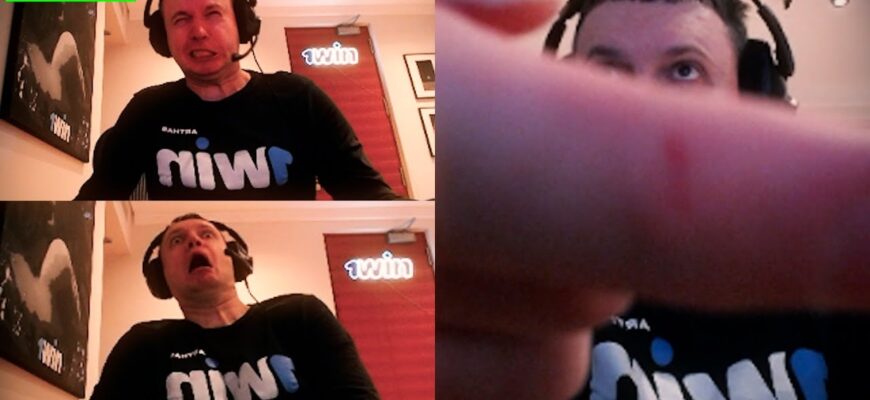In a surprising and rather ironic twist, Vitaly “Papich” Tsal, a widely recognized figure in the Russian-speaking streaming community and a prominent Dota 2 personality, recently offered a scathing critique of his very own profession. His assessment? He wouldn`t bother watching his own streams if he were a young adult today, boldly labeling the act of consuming streams, and even professional esports, as largely “meaningless.”
A Self-Professed Non-Viewer: The Streamer Who Doesn`t Stream-Watch
During a personal broadcast that garnered significant attention, Papich – whose online presence consistently draws a dedicated viewership – was directly posed a pertinent question: “Would you watch yourself, being an 18-25-year-old guy?” His reply was unequivocal and, for many, remarkably candid. “I don`t watch anyone at all,” he declared, further clarifying that his engagement with other streamers` content is, at best, sporadic. The implicit message was clear: the very digital entertainment medium from which he derives his livelihood holds little personal appeal for him as a consumer.
“Streams are just a pastime, like playing some stupid game, you know, like Zombie Survivor, Vampire Survivors. Some utterly dumb game, senseless. A game without any personal development, so to speak. A multiplayer game like Counter-Strike might develop you somehow, for example, but playing all sorts of useless games – I don`t see the point. Watching streams is pretty much the same.”
This statement provides a fascinating, if not perplexing, window into the mind of a content creator who, despite his notable success, appears to maintain a distinctly detached perspective on the inherent value of the digital content he produces. He articulates a sharp distinction between what he categorizes as “meaningless” games, citing titles like Vampire Survivors, and those he believes offer “personal development,” such as competitive multiplayer experiences like Counter-Strike. For Papich, the act of watching streams falls squarely into the former category, primarily serving as a passive time-filler rather than an enriching or constructive activity.
The Esports Enigma: “Filth” and “Disease”?
Papich`s critique extends beyond individual streams to encompass the broader landscape of organized competitive gaming. He openly expressed bewilderment at the enduring popularity and viewership numbers of professional Dota 2 matches, questioning the underlying motivations that drive such interest. “To be interested in pro-Dota, to watch this filth? It genuinely feels like some kind of disease,” he mused, without a hint of irony. This remarkably strong language underscores his conviction that the consumption of esports, much like casual streaming, lacks any significant intrinsic value or developmental benefit.
This perspective is particularly noteworthy given Papich`s deep immersion in the Dota 2 ecosystem, having largely built his online persona and reputation through his expertise and commentary on the game. It strongly suggests a fundamental divergence between his personal valuation of a digital activity and its widespread public appeal and perceived importance.
The Paradox of the Digital Age: A Creator`s Conundrum
Papich`s unvarnished remarks unveil a peculiar paradox at the heart of the modern digital entertainment industry. Here stands a highly successful streamer, operating within a sphere that thrives on continuous audience engagement and content consumption, yet he openly questions the very foundational premise of that engagement. It forces both viewers and fellow creators to pause and reflect on the nuanced nature of digital entertainment:
- Value Proposition: What genuinely constitutes “meaningful” entertainment in the vast digital realm? Is personal development truly a prerequisite for worthwhile leisure time?
- Creator`s Conscience: Do other successful creators harbor similar underlying sentiments, perhaps in private, even as they actively contribute to the ever-increasing deluge of content?
- Audience Engagement: Is the audience consciously aware, or perhaps even indifferent, to such a detached and critical perspective emanating from one of their favored online personalities?
His commentary, while potentially perceived as dismissive by some, could also be interpreted as a raw, unflinchingly honest assessment from a seasoned veteran who has witnessed the dramatic evolution of streaming firsthand. In an era where “content is king,” Papich audaciously challenges the very foundation of that kingdom, suggesting that much of what is consumed might be less about substantive, engaging experiences and more about the simple, passive act of filling vacant hours.
An Inadvertent Call for Conscious Consumption?
While delivered with characteristic bluntness, Papich`s controversial statements might inadvertently serve as a provocative call for more conscious media consumption. If even a highly successful streamer finds the core activity of streaming largely unfulfilling, it could gently encourage viewers to critically examine the qualitative aspects of their own digital habits. Is the time spent watching endless streams or competitive matches genuinely engaging, thought-provoking, or personally enriching, or is it merely a passive placeholder for more active, perhaps even developmental, pursuits?
In a world increasingly saturated with digital distractions and ephemeral content, Papich`s “meaningless” label might serve as a jarring, albeit ironic, reminder. It’s a nudge to actively seek out activities that offer more than just fleeting amusement – perhaps even a little of that elusive “personal development” he so values.







